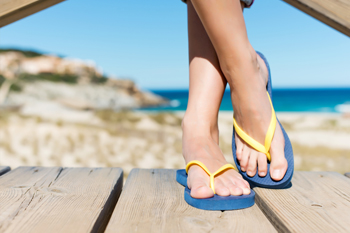 Flip flops may be easy to slip on and look great with casual outfits, but they are not great for everyday footwear, partly because they change the way you walk. Flip flop wearers take smaller steps, which puts more stress on the body and may lead to pain in joints and muscles. To keep flip flops on, people tend to scrunch up the toes, which limits muscle movement and causes you to shuffle your feet more than if you were wearing traditional shoes. The flat sole and lack of support of flip flops can cause heel pain and even plantar fasciitis—especially for those who are overweight. Flip flops have their place on the beach, at the poolside, or in the locker room, but give your feet a break and limit the time you wear them. Check with a podiatrist if you have any pain in the heel or the foot, and for suggestions on the most appropriate footwear to avoid injury.
Flip flops may be easy to slip on and look great with casual outfits, but they are not great for everyday footwear, partly because they change the way you walk. Flip flop wearers take smaller steps, which puts more stress on the body and may lead to pain in joints and muscles. To keep flip flops on, people tend to scrunch up the toes, which limits muscle movement and causes you to shuffle your feet more than if you were wearing traditional shoes. The flat sole and lack of support of flip flops can cause heel pain and even plantar fasciitis—especially for those who are overweight. Flip flops have their place on the beach, at the poolside, or in the locker room, but give your feet a break and limit the time you wear them. Check with a podiatrist if you have any pain in the heel or the foot, and for suggestions on the most appropriate footwear to avoid injury.
Flip-flops can cause a lot of problems for your feet. If you have any concerns about your feet or ankles, contact one of our podiatrists from Summit Podiatry. Our doctors will assist you with all of your foot and ankle needs.
Flip-Flops and Feet
Flip-flops have managed to become a summer essential for a lot of people. While the shoes may be stylish and easy to slip on and off, they can be dangerous to those who wear them too often. These shoes might protect you from fungal infections such as athlete’s foot, but they can also give you foot pain and sprained ankles if you trip while wearing them.
When Are They Okay to Wear?
Flip-flops should only be worn for very short periods of time. They can help protect your feet in places that are crawling with fungi, such as gym locker rooms. Athlete’s foot and plantar warts are two common fungi that flip-flops may help protect your feet against.
Why Are They Bad for My Feet?
These shoes do not offer any arch support, so they are not ideal for everyday use. They also do not provide shock absorption or heel cushioning which can be problematic for your feet. Additionally, you may suffer from glass cuts, puncture wounds, and stubbed toes since they offer little protection for your feet.
More Reasons Why They Are Bad for Your Feet
- They Slow You Down
- May Cause Blisters and Calluses
- Expose Your Feet to Bacteria
If you have any questions, please feel free to contact one of our offices located in Wilmington, Whiteville, and Wallace, NC . We offer the newest diagnostic and treatment technologies for all your foot care needs.
